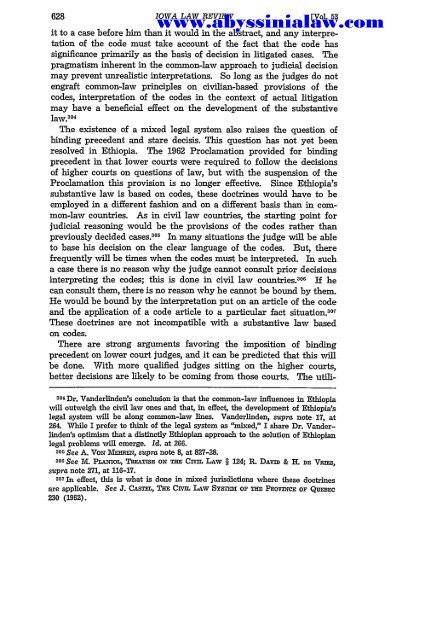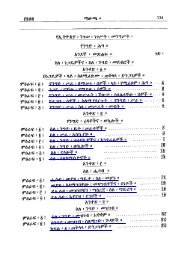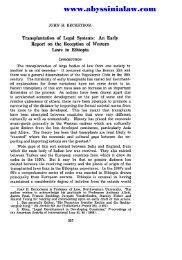Create successful ePaper yourself
Turn your PDF publications into a flip-book with our unique Google optimized e-Paper software.
IOWA LAW REVIEW<br />
]'VOL 53<br />
www.abyssinialaw.com<br />
it to a case before him than it would in the abstract, and any interpretation<br />
of the code must take account of the fact that the code has<br />
significance primarily as the basis of decision in litigated cases. The<br />
pragmatism inherent in the common-law approach to judicial decision<br />
may prevent unrealistic interpretations. So long as the judges do not<br />
engraft common-law principles on civilian-based provisions of the<br />
codes, interpretation of the codes in the context of actual litigation<br />
may have a beneficial effect on the development of the substantive<br />
30 4<br />
law.<br />
The existence of a mixed legal system also raises the question of<br />
binding precedent and stare decisis. This question has not yet been<br />
resolved in Ethiopia. The 1962 Proclamation provided for binding<br />
precedent in that lower courts were required to follow the decisions<br />
of higher courts on questions of law, but with the suspension of the<br />
Proclamation this provision is no longer effective. Since Ethiopia's<br />
substantive law is based on codes, these doctrines would have to be<br />
employed in a different fashion and on a different basis than in common-law<br />
countries. As in civil law countries, the starting point for<br />
judicial reasoning would be the provisions of the codes rather than<br />
previously decided cases. 30 5 In many situations the judge will be able<br />
to base his decision on the clear language of the codes. But, there<br />
frequently will be times when the codes must be interpreted. In such<br />
a case there is no reason why the judge cannot consult prior decisions<br />
interpreting the codes; this is done in civil law countries. 306 If he<br />
can consult them, there is no reason why he cannot be bound by them.<br />
He would be bound by the interpretation put on an article of the code<br />
and the application of a code article to a particular fact situation. 3<br />
These doctrines are not incompatible with a substantive law based<br />
on codes.<br />
There are strong arguments favoring the imposition of binding<br />
precedent on lower court judges, and it can be predicted that this will<br />
be done. With more qualified judges sitting on the higher courts,<br />
better decisions are likely to be coming from those courts. The utili-<br />
304 Dr. Vanderlinden's conclusion is that the common-law influences in Ethiopia<br />
will outweigh the civil law ones and that, in effect, the development of Ethiopia's<br />
legal system will be along common-law lines. Vanderlinden, supra note 17, at<br />
264. While I prefer to think of the legal system as "mixed," I share Dr. Vanderlinden's<br />
optimism that a distinctly Ethiopian approach to the solution of Ethiopian<br />
legal problems will emerge. Id. at 266.<br />
30 5 See A. VON 1MEHEn, supra note 8, at 827-28.<br />
306 See M. PLAMOL, TREATISE ON THE CIVIL LAw § 124; R. DAVID & H. DE VMs,<br />
supra note 271, at 116-17.<br />
307 In effect, this is what is done in mixed jurisdictions where these doctrines<br />
are applicable. See J. CASTEL, THE CNrVL LAw Sysr=r OF THE PROvncE OF QuEBEC<br />
230 (1962).





